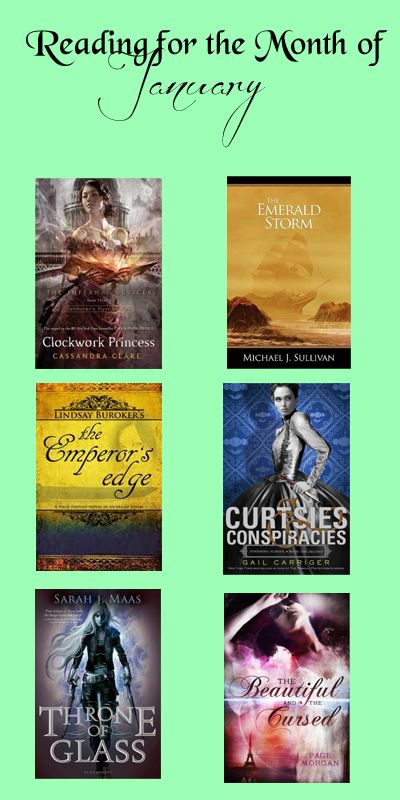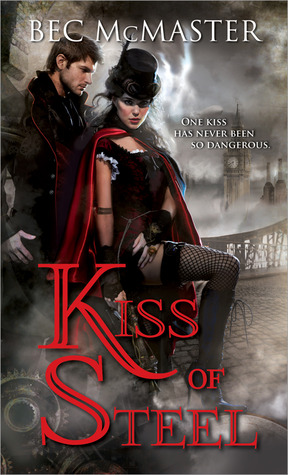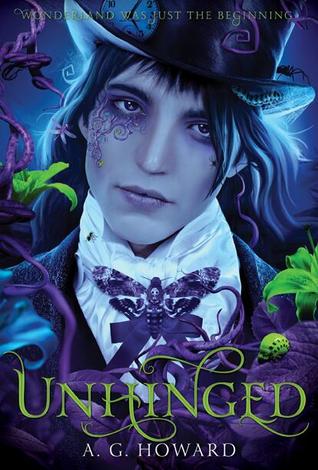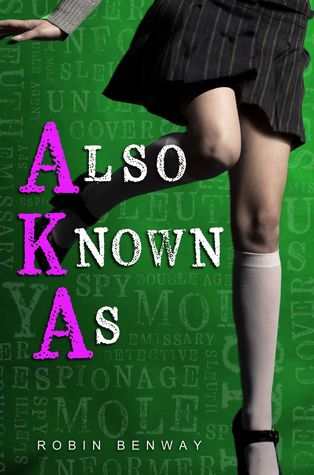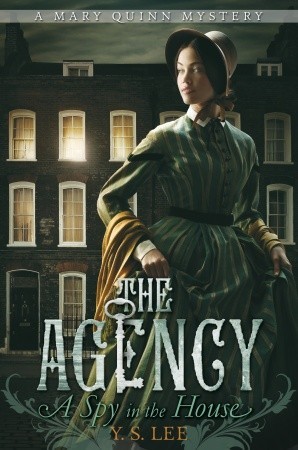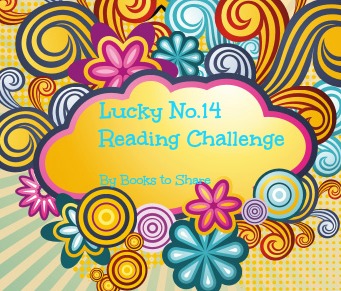Kiss of Steel by Bec McMaster
Series: London Steampunk #1
Published by Sourcebooks Casablanca
Pages: 423
Genre: Romance/Urban Fantasy/Historical (Mature)
Rating: Blech
Add on Goodreads
Honoria Todd, father recently deceased, is left to look after her two younger siblings. Unable to pay for the house that they live in, Honoria does the only thing she can think of, packing them up to live in Whitechapel. But, once there, she attracts the attention of Blade, the king of the rookeries. Blade says that he'll protect her but, with vampiric bloodlust humming for Honoria in his veins, he might pose the most danger to her of all.
Quote
'She'd accepted his protection. That meant that any trespass on her person by another man was cause enough to kill.'
Disclaimer:
I only read about half of the book and then, around page two hundred thirty-four,
began skimming. Because of this, some of the issues I had might be inapplicable to
what happens in the latter half of the book. Also, because of this, I will not be adding
this book to any of my challenges. Also, please note that this review contains a few
spoilers about the world and what some of the terms mean for this setting.
I picked up this book because I thought it was going to be a steampunk romance. How wrong I was. This book has a slight - very slight - level of steampunk, and that's mostly thanks to one character's automail arm. Oh, and the little automaton that reminded me of a robotic vacuum. What this book is, is a paranormal romance and little else. The romance, as it is, is expected to carry the whole book. Now, that probably works for some people - but I was misled as to what this book was.
I didn't realize that the main guy was a vampire - for all the author's unwillingness to use that word when describing him. There's two different types of vampires in this book: the vicious, blood thirsty creatures that are nothing more than a walking corpse (they even smell like one)… and the 'blue-bloods' that are every teen girl's dream. The term 'blue-blood' actually has double meaning in this book, both separating the vampires from the more 'in control' beasts, and because - at least in theory - only the toffs can be infected with 'the virus'. To me this book really sounds like Ms. McMaster wanted her cake and to eat it too. She's got the old-fashioned vampires - the ones that are nothing more than walking, rotting corpses that think of little else besides food, of which we are their primary source - however, that wouldn't make a good romance hero. So, she make vampires an offshoot of 'blue-bloods' - or, rather, what 'blue-bloods' become when they 'fade'.
There was also a lot of talk about 'a cure'. Now, I won't deny that I used to be easily taken by vampires - but that was before all this dark, brooding, 'the cure' business that seems to have been first popularized by Angel. (TV series of the same name. Spin off of Buffy: the Vampire Slayer.) I hate vampire stories where they are looking for 'the cure' as if being a vampire was a disease that has absolutely no upside. In the defense of this book, at least the 'virus' would kill the infected eventually - or, rather, turn them into raving, bloodthirsty beasts - so you can kind of understand people not wanting to be that. However, Blade is still alive and going strong fifty years after being infected, so you can expect at least a normal lifespan as well as one greatly enhanced in prowess and abilities. I would like to add that the ending and how they dealt with Blade's 'virus' seemed like a great cop-out to me.
The world was incredibly confusing and it took way too long to figure out what terms like 'Echelon' and 'The Virus' and 'Blue-Bloods' actually meant in this world. I will admit that I was intrigued by the world building - which was probably why I stuck it out as long as I did. However, once you actually understand what each of these terms mean, there just wasn't anything there for me.
I would love to say that the characters made it all worth while… but they didn't. Honoria was kind of stupid and way too quick to fall in
love lust with Blade. And Blade himself…First I must mention how unfortunate the name is. Really? A vampire named 'Blade'? Now where have I heard that before? (If you don't know, Blade is a dhampir - a half-human/half-vampire crossbreed - in the Marvel Universe that hunts vampires.) So sorry, this Blade is a pale imitation (no pun intended, I assure you) of that Blade. And this vampire was really off putting when you first get inside is head. You see, Blade had just met Honoria for all of ten minutes - and he already decided that he would make her his. *shudder* That's pretty much the limit of his character thoughts, too. 'she's mine' 'I will claim her' and on and on ad nauseam.
(Ick, I'm feeling a little squicked out now.) This alpha male mentality is one reason I've never really read many romance novels. Not to mention the little habit many romance authors seem to have of using the 'no means yes' mentality. (Yes, this book has that too. Lucky me.)
I'm not really sure what was supposed to be the plot of this story as even the few romance novels I've read have more of a plot than this one does. It just seemed to boil down to Honoria having to let herself go enough to admit that she wanted Blade. (Admit that to his face, I mean. She already admitted it to herself the first time he pressed himself against her and held a knife to her throat. During their first meeting. Yes, I found it as pleasant sounding in context as out.) And Blade working on fattening Honoria up enough that he could
make her his feed on her suck her blood aw hell, there's no way of saying that that doesn't make me want to cover my neck and run for the hills.
A couple of final notes now. First, I was enchanted by the cover. However, Blade looked nothing like the - admittedly handsome - guy on the cover. Even the hair color is wrong. And I surely never recalling reading Honoria dressed like that.
And, secondly: the technical aspects of the writing were good - and I'll willingly admit that they were. There were no confusion and needing to re-read a sentence five times until it, finally, made sense. I could easily picture the scenes and local. That's all to the good. Unfortunately, this is destined to be a good news/bad news scenario. While the technical writing was good, the creative aspect failed for me. It was almost as though a checklist was laid out for the best way to get readers. Something that, if I'm going by the books reception at Goodreads, paid off wonderfully.
Honestly, while reading this book it really felt like I was reading a poor knockoff/imitation of the Parasol Protectorate series. Victorian London? Check. Paranormal/Supernatural love interest? Check. 'Independent' female? Check. Steampunk aesthetic? Check. But really, this book failed in so many aspects and didn't even have interesting characters. Or even entertaining characters.

